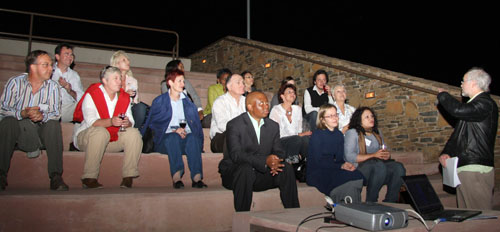Latest News Archive
Please select Category, Year, and then Month to display items
04 April 2024
|
Story Lunga Luthuli
|
Photo SUPPLIED
 Dr Juliet Kamwendo champions gender-inclusive climate action in Africa. Her expertise at the recently held AFR100 workshop highlighted vital steps towards sustainable and equitable development.
Dr Juliet Kamwendo champions gender-inclusive climate action in Africa. Her expertise at the recently held AFR100 workshop highlighted vital steps towards sustainable and equitable development.
Dr Juliet Kamwendo, Lecturer and Programme Director for Gender Studies in the Centre for Gender and Africa Studies at the University of the Free State, is spearheading efforts to integrate gender considerations into Africa's climate restoration agenda. Reflecting on her involvement, Dr Kamwendo stated, "This is particularly crucial, as women make up almost 50% of the population in Africa, and the depletion and degradation of land affect them disproportionately."
She recently served as a gender expert at the AUDA-NEPAD AFR100 workshop in Ouagadougou, Burkina Faso, from 25 to 29 March 2024. This initiative aims to restore forests and degraded land across Africa by 2030, with a focus on gender equality.
The workshop emphasised the integration of gender perspectives into the AFR100 project, acknowledging the disproportionate impact of land degradation on women. Dr Kamwendo's expertise highlighted the need to empower women in climate change interventions, addressing existing gender inequalities exacerbated by environmental degradation.
“Women – who are primarily responsible for household food security and water provision – bear the brunt of environmental degradation, leading to increased workloads, reduced income opportunities, and heightened vulnerability to climate-related disasters. Furthermore, the loss of forest cover and biodiversity further exacerbates the challenges faced by women, particularly in rural areas where they depend heavily on natural resources for their livelihoods,” added Dr Kamwendo.
Her participation highlights academia's crucial role in fostering inclusive and sustainable development, emphasising interdisciplinary collaboration to tackle complex environmental challenges. Through initiatives such as AFR100, stakeholders are working towards a more resilient and gender-responsive future for Africa.
Gauteng business community experiences UFS
2010-09-23
 |
|
Prof. Matie Hoffman from the Department of Physics of the UFS, presenting at the Boyden Observatory to a group of business executives from Gauteng, during their recent visit to the university.
Photo: Gerhard Louw
|
The University of the Free State’s (UFS) Corporate Liaison Office recently hosted a group of eleven business men and women from the private sector in Gauteng on its Main Campus in Bloemfontein. The purpose of the campus visits, which are held two to three times a year, is to give representatives from the corporate sector the opportunity to get to know the UFS first-hand and to help build the brand of the university as a national asset.
During their visit the group of business men and women, amongst others, met with faculty members, they enjoyed a networking session with UFS staff at the Oliewenhuis Art Museum, visited the Unit for Students with Disabilities as well as the Department of Paediatrics and Child Health.
The day ended at the Boyden Observatory where a feedback session was facilitated by Prof. Jonathan Jansen, Rector and Vice-Chancellor, and Prof. Ezekiel Moraka, Vice-Rector: External Relations. After this opportunity where the visitors discussed their experience of the UFS, the day came to an end with a presentation on: The African skies: Stories and science by a Ph.D. candidate from the Department of Physics, Mr Bosco Oruru. One of the highlights of the evening included a sighting of the Hubble Telescope in the sky over Bloemfontein and observing the moon and Venus through one of the Boyden telescopes.
The visitors left with new insights and a great appreciation for the contribution of the UFS to education, research and community service in South Africa.